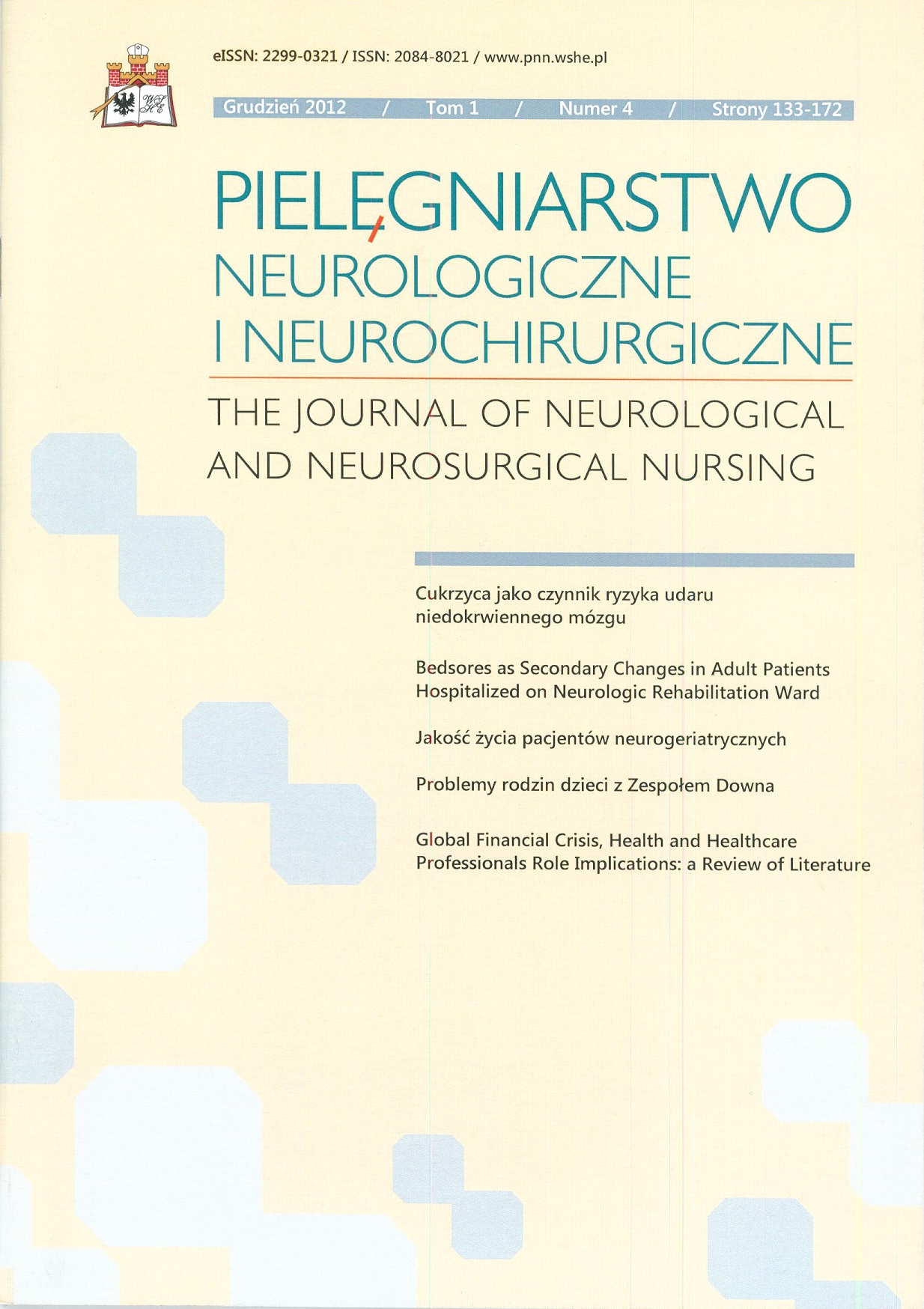Problemy rodzin dzieci z zespołem Downa
Słowa kluczowe
zespół Downa, problemy rodziców, wada genetycznaAbstrakt
Wprowadzenie. Zespół Downa to choroba cechująca się zaburzeniami rozwojowymi. Jest wadą genetyczną charakteryzującą się obecnością dodatkowego, nadprogramowego chromosomu w 21 parze. Prowadzi to do upośledzenia umysłowego i fizycznego.
Cel. Celem pracy jest przedstawienie problemów rodzin dzieci z zespołem Downa.
Materiał i metody. W badaniu wzięło udział 50 rodzin dzieci z zespołem Downa. Badania przeprowadzono przy pomocy kwestionariusza własnej konstrukcji.
Wyniki. Przeprowadzone badania wykazały, że rodziny dzieci z zespołem Downa od chwili narodzin chorego dziecka mają wiele trudności. Dziecko z zespołem Downa niełatwo jest zaakceptować – 20% ankietowanych do tej pory nie oswoiło się z zaistniałą sytuacją. Dziecko z zespołem Downa może w różny sposób wpłynąć na rodzinne stosunki – może je zacieśnić, zbliżyć – tak uznało 28% rodziców, lub wręcz przeciwnie – oddalić rodzinę od siebie i poróżnić, tak się stało w przypadku 52% respondentów. Opieka nad dzieckiem z zespołem Downa nie należy do łatwych zajęć. Zależne jest to oczywiście od poziomu wiedzy rodziców na temat zespołu Downa i najlepiej, jeśli zdają sobie oni z tego sprawę jeszcze przed narodzinami dziecka. Wówczas mogą możliwie najszybciej podjąć kroki prowadzące do prawidłowej pielęgnacji, leczenia, rehabilitacji, terapii i wszelkiej innej stymulacji rozwojowej chorego dziecka. U dzieci z zespołem Downa upływający czas ma bowiem szczególne znaczenie – jeśli odpowiednio wcześnie dziecko takie nie opanuje pewnych czynności, później będzie mu trudniej nadrobić te niedostatki bądź będzie to niemożliwe. 40% badanych stwierdziło, że ich wiedza o chorobie ich dziecka jest bardzo dobra i systematycznie pogłębiana. 36% respondentów oceniło swoją wiedzę dobrze, zaś 20% wskazało, że jest ona przeciętna. Tylko 4% ankietowanych oceniło swoją wiedzę na ten temat źle.
Wnioski. Zespół Downa to choroba, z którą można normalnie żyć i funkcjonować. Wiele zależy od rodziców chorych dzieci, którzy muszą nauczyć się bycia silnymi osobami, okazywać wiele miłości, wsparcia i zrozumienia dla swych pociech. Rodzice, którzy potrafią nawiązać dobry kontakt z dzieckiem z zespołem Downa sprawiają, że
ich pociechy mogą żyć normalnie. (PNN 2012;1(4):156-163)
Bibliografia
Minczakiewicz E.M. Zespół Downa. Księga Pytań i Odpowiedzi. Wydawnictwo Harmonia, Gdańsk 2010.
Chomicz L., Szablewski L., Rebandel H. Podstawy genetyki człowieka. Wydawnictwo WUM, Warszawa 2009.
Kaczmarek B.B. Wspomaganie rozwoju dzieci z zespołem Downa – teoria i praktyka. Oficyna Wydawnicza Impuls, Kraków 2008.
Minczakiewicz E.M. Jak pomóc w rozwoju dziecka z zespołem Downa. Poradnik dla rodziców i wychowawców. Wydawnictwo Naukowe Akademii Pedagogicznej, Kraków 2001.
Żyta A. Rodzeństwo osób z głębszą niepełnosprawnością intelektualną. Oficyna Wydawnicza Impuls, Kraków 2004.
Zasępa E. Rozwój intelektualny dzieci z zespołem Downa. Wydawnictwo Akademii Pedagogiki Specjalnej, Warszawa 2003.
Łata W. Wyrazy dźwiękonaśladowcze w ekspresji i komunikacji językowej dzieci w wieku przedszkolnym. Wydawnictwo Naukowe Uniwersytetu Pedagogicznego, Kraków 2008.
Montessori M. Domy dziecięce: metoda pedagogiki naukowej stosowana w wychowaniu najmłodszych dzieci. Wydawnictwo Akademickie Żak, Warszawa 2005.
Pobrania
Opublikowane
Jak cytować
Numer
Dział
Licencja

Utwór dostępny jest na licencji Creative Commons Uznanie autorstwa – Bez utworów zależnych 4.0 Międzynarodowe.
Statystyki
Liczba wyświetleń i pobrań: 3597
Liczba cytowań: 0
